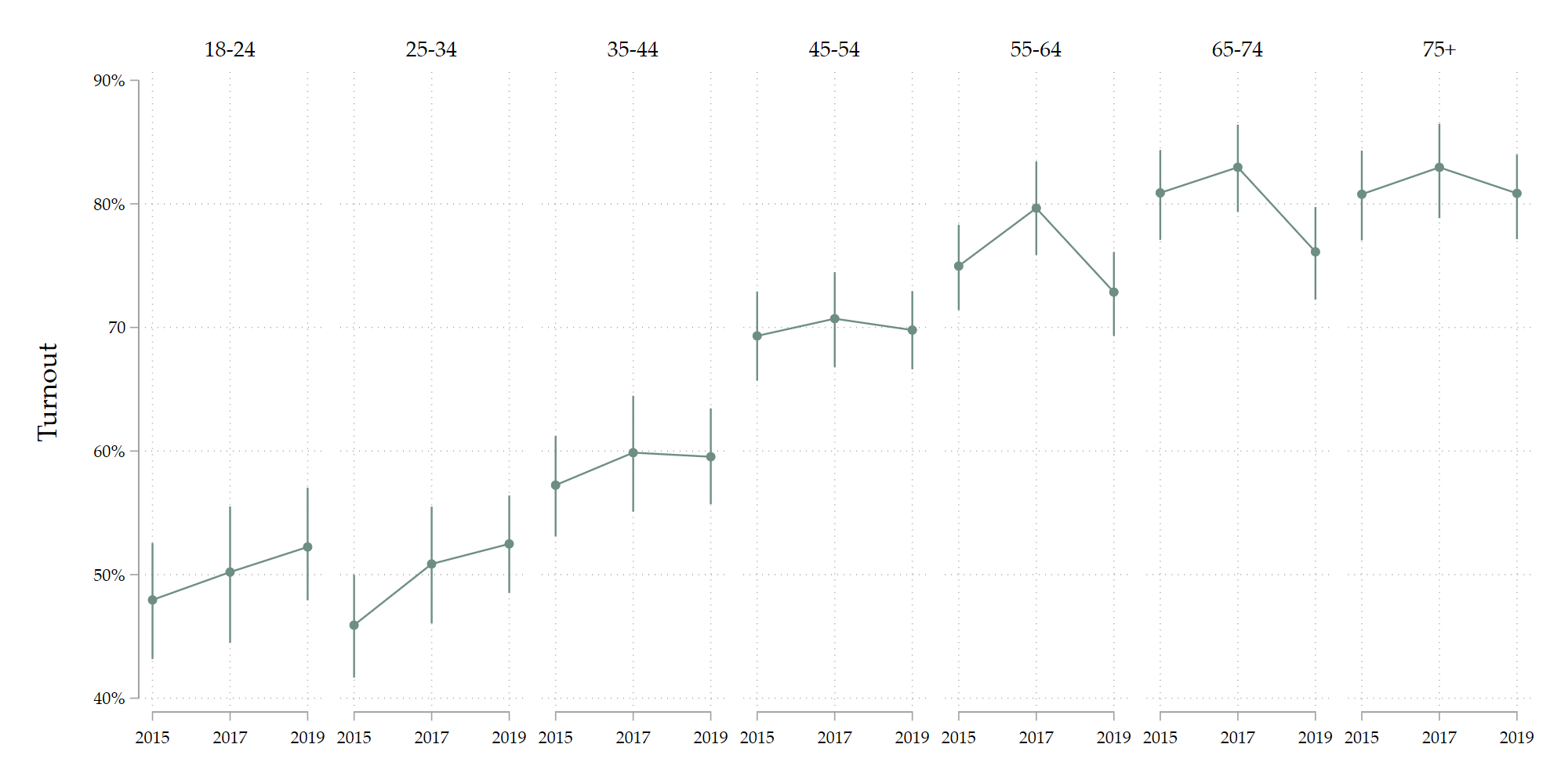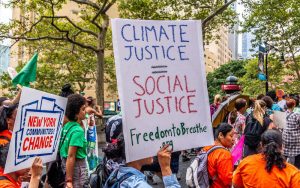Are young people becoming more disengaged with politics? Or have they found new ways to get politically involved…..
Depending on the context and definition, opinions can differ on whether young people are politically engaged. Generally, young people tend to be less politically engaged compared to older generations. Although it is good to note that this is a generalisation and does not reflect all young people around the world.

(Figure 1)- UK General Elections: Turnout by age (Data via British Electoral Study).
The UK general elections voter turnout by age suggests that young people are less likely to vote when compared to older groups. According to this data around 53% of young people aged 18-24 had voted in the 2019 UK general election, compared to the 75% of older people aged 65-74. This pattern of older people voting more than younger people is consistent with previous general elections in the UK. Younger people generally have had a lower turnout than older groups, but why is this?
Young people being politically engaged is a very important topic and issue because it has the potential to shape our future society and politics. Although many young people are very engaged in political activities, many other young people, however, are disengaged or feel like they have been let down by the political process.
Here are some causes of why there is low political engagement among young people:
One cause of this is the disillusionment with the political process, many young people see politics as corrupt and dominated by special interests and feel as if their vote doesn’t matter as politicians don’t care about their concerns. This sense of dissatisfaction from young people can be a major barrier to political engagement.
https://www.theguardian.com/politics/2022/apr/10/young-adults-loss-of-faith-in-uk-democracy-survey
This article by the Guardian highlights the various reasons why young people may be disenchanted with politics in the UK.
Young people are less likely to trust politicians when compared to older generations. Young people usually view politicians as dishonest and untrustworthy, making them less likely to engage in politics. This lack of trust can be nourished by broken promises and scandals, and an overall sense that politicians put their own interests and needs before the people they represent.
https://www.bbc.co.uk/news/uk-politics-63583833
This article by the BBC highlights a scandal involving Matt Hancock, who was caught on CCTV breaking social distancing rules by kissing his aide in his government office during the peak of the pandemic. This scandal highlights how hypocritical the government can be, which ultimately may lead young people to believe that the advice the government sets out is actually insincere and lead them to not want to engage with politics.
Another factor that contributes to low levels of political engagement among young people is a lack of understanding and knowledge of the political process. Many young people are unsure of how politics works and how laws are made, which ultimately can make them unsure of how to get involved in the political process overall. This lack of knowledge can leave young people feeling overwhelmed, and they may become tentative to get involved with politics.
Overall, there is a multitude of reasons why young people are not as politically engaged as other groups of people. To be able to address and resolve these issues, we need to find solutions to engage young people in politics and the political process so that we can make sure that the political process becomes more accessible and clearer for young people. Young people need to have a voice because they will be the ones to shape our future.
What are the new ways that young people can be politically involved?

Although young people may not politically participate through voting, they find other ways to be involved and engaged in politics. For example, young people are often at the forefront of protests and social movements, such as the Black Lives Matter Movement and climate change strikes. These actions taken by young people can be seen as a form of political engagement even if it’s not the traditional way that society is used to. Ultimately, we are in a society that is heavily changing as generations go by and each generation may find new ways to be politically engaged. Like through online activism, young people are more likely to engage in online activities such as sharing political posts on social media and signing online petitions. Although this is not the typical way to politically engage and may not be as visible as other traditional forms of political participation, it can have a great impact on political outcomes.
To conclude, young people generally speaking are less politically engaged than older generations, however, this does not mean that young people are disengaged as a whole. There is a multitude of ways in which young people can be politically engaged, both through traditional political institutions and through other forms of engagement and activism.
Youth participation is crucial to the future of democracy: how can we encourage it?
Young people’s political engagement can be increased by giving them a chance to study political issues as well as to allow them to take part in political activities. this includes internships with political campaigns or government agencies and opportunities to participate in community organizations that focus on political issues.
Creating youth councils or advisory boards to allow young people to participate in debates and public forums can encourage youth participation and improve low engagement levels. increasing political engagement among young people requires an all-around approach that involves engagement at all levels of government and society, outreach and education. Young people’s political engagement must be taken seriously because it can have long-lasting effects on society.
The youth are the future of society and have the right to be involved in decisions that will affect the rest of their lives. Being politically involved is a right and a necessity, so moving forward we as a society including our governments and institutions need to actively try to ensure the increase of political engagement levels among young people.
Bibliography:
Blais, André. To Vote or Not to Vote: The Merits and Limits of Rational Choice Theory. University of Pittsburgh Press, 2000. JSTOR, https://www.jstor.org/stable/j.ctt5hjrrf (Accessed: 28 Feb. 2023).
British Election Study, 2021. Age and Voting behaviour at the 2019 general election. https://www.britishelectionstudy.com/bes-findings/age-and-voting-behaviour-at-the-2019-general-election/#.ZACCSC2l1QJ (Accessed:27,02,2023).
Circle, 2020. Election week 2020: Young people increase turnout, lead Biden to victory. https://circle.tufts.edu/latest-research/election-week-2020#youth-voter-turnout-increased-in-2020 (Accessed:27,02,2023).
Horton, T, (2020). young adults have dramatic loss of faith in UK democracy, survey reveals. https://www.theguardian.com/politics/2022/apr/10/young-adults-loss-of-faith-in-uk-democracy-survey (Accessed: 27,02,2023).
Morton, B, 2022. Matt Hancock: why is the ex-health secretary a controversial figure. https://www.bbc.co.uk/news/uk-politics-63583833 (Accessed:27,02,2023).
Pires, C, 2018. ‘Young people are angry’: the teenage activists shaping our future. https://www.theguardian.com/society/2018/may/13/young-people-are-angry-meet-the-teenage-activists-shaping-our-future (Accessed:27,02,2023).